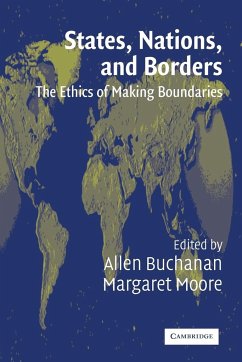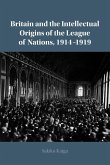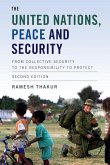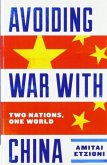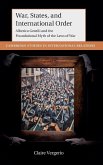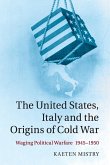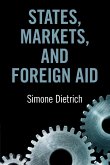Allen Buchanan / Margaret Moore (eds.)The Ethics of Making Boundaries
States, Nations, and Borders
The Ethics of Making Boundaries
Herausgeber: Buchanan, Allen; Moore, Margaret
Allen Buchanan / Margaret Moore (eds.)The Ethics of Making Boundaries
States, Nations, and Borders
The Ethics of Making Boundaries
Herausgeber: Buchanan, Allen; Moore, Margaret
- Broschiertes Buch
- Merkliste
- Auf die Merkliste
- Bewerten Bewerten
- Teilen
- Produkt teilen
- Produkterinnerung
- Produkterinnerung
This volume examines comparatively the views and principles of seven prominent ethical traditions on the issue of the making and unmaking of state and national boundaries. The traditions represented are Judaism, Christianity, Islam, natural law, Confucianism, liberalism and international law.
Andere Kunden interessierten sich auch für
![Britain and the Intellectual Origins of the League of Nations, 1914-1919 Britain and the Intellectual Origins of the League of Nations, 1914-1919]() Sakiko Kaiga (University of Tokyo)Britain and the Intellectual Origins of the League of Nations, 1914-191931,99 €
Sakiko Kaiga (University of Tokyo)Britain and the Intellectual Origins of the League of Nations, 1914-191931,99 €![The United Nations, Peace and Security The United Nations, Peace and Security]() Ramesh Thakur (Canberra Australian National University)The United Nations, Peace and Security40,99 €
Ramesh Thakur (Canberra Australian National University)The United Nations, Peace and Security40,99 €![Avoiding War with China: Two Nations, One World Avoiding War with China: Two Nations, One World]() Amitai EtzioniAvoiding War with China: Two Nations, One World27,99 €
Amitai EtzioniAvoiding War with China: Two Nations, One World27,99 €![War, States, and International Order War, States, and International Order]() Claire Vergerio (Universiteit Leiden)War, States, and International Order92,99 €
Claire Vergerio (Universiteit Leiden)War, States, and International Order92,99 €![The United States, Italy and the Origins of Cold War The United States, Italy and the Origins of Cold War]() Kaeten Mistry (University of East Anglia)The United States, Italy and the Origins of Cold War42,99 €
Kaeten Mistry (University of East Anglia)The United States, Italy and the Origins of Cold War42,99 €![States, Markets, and Foreign Aid States, Markets, and Foreign Aid]() Simone Dietrich (Universite de Geneve)States, Markets, and Foreign Aid42,99 €
Simone Dietrich (Universite de Geneve)States, Markets, and Foreign Aid42,99 €![States, Citizens and the Privatisation of Security States, Citizens and the Privatisation of Security]() Elke Krahmann (Brunel University)States, Citizens and the Privatisation of Security42,99 €
Elke Krahmann (Brunel University)States, Citizens and the Privatisation of Security42,99 €-
-
-
This volume examines comparatively the views and principles of seven prominent ethical traditions on the issue of the making and unmaking of state and national boundaries. The traditions represented are Judaism, Christianity, Islam, natural law, Confucianism, liberalism and international law.
Produktdetails
- Produktdetails
- Verlag: Cambridge University Press
- Seitenzahl: 376
- Erscheinungstermin: 1. März 2003
- Englisch
- Abmessung: 229mm x 152mm x 22mm
- Gewicht: 558g
- ISBN-13: 9780521525756
- ISBN-10: 0521525756
- Artikelnr.: 21863503
- Herstellerkennzeichnung
- Libri GmbH
- Europaallee 1
- 36244 Bad Hersfeld
- gpsr@libri.de
- Verlag: Cambridge University Press
- Seitenzahl: 376
- Erscheinungstermin: 1. März 2003
- Englisch
- Abmessung: 229mm x 152mm x 22mm
- Gewicht: 558g
- ISBN-13: 9780521525756
- ISBN-10: 0521525756
- Artikelnr.: 21863503
- Herstellerkennzeichnung
- Libri GmbH
- Europaallee 1
- 36244 Bad Hersfeld
- gpsr@libri.de
1. Introduction Allen Buchanan and Margaret Moore; Part I. The Jewish
Tradition: 2. Making and unmaking the boundaries of the Holy Land Menachem
Lorberbaum; 3. Man-made boundaries and man-made holiness in the Jewish
tradition Daniel Statman; Part II. The Confucian Tradition: 4. The making
and unmaking of boundaries: a contemporary Confucian perspective Daniel
Bell; 5. Borders of our minds: territories, boundaries, and power in the
Confucian tradition L. H. M. Ling; Part III. The Christian Tradition: 6.
The Christian tradition Anthony Pagden; 7. Christianity and territorial
right Reverend Oliver O'Donovan; Part IV. The Natural Law Tradition: 8. The
making and unmaking of boundaries from the Natural Law perspective Richard
Tuck; 9. Natural Law and the re-making of boundaries John Finnis; Part V.
The Islamic Tradition: 10. Political boundaries and moral communities: an
Islamic perspective Sohail H. Hashmi; 11. The unbounded law of God and
territorial boundaries Khaled Abou El Fadl; Part VI. The Liberal Tradition:
12. The making and unmaking of boundaries: what liberalism has to say Allen
Buchanan; 13. Liberalism and boundaries: a response to Allen Buchanan David
Miller; Part VI. The International Law Tradition: 14. The making and
unmaking of boundaries: international law Andrew Hurrell; 15. People and
boundaries: an internationalized public law approach Benedict Kingsbury;
Part VIII. Conclusion: 16. Overview Margaret Moore.
Tradition: 2. Making and unmaking the boundaries of the Holy Land Menachem
Lorberbaum; 3. Man-made boundaries and man-made holiness in the Jewish
tradition Daniel Statman; Part II. The Confucian Tradition: 4. The making
and unmaking of boundaries: a contemporary Confucian perspective Daniel
Bell; 5. Borders of our minds: territories, boundaries, and power in the
Confucian tradition L. H. M. Ling; Part III. The Christian Tradition: 6.
The Christian tradition Anthony Pagden; 7. Christianity and territorial
right Reverend Oliver O'Donovan; Part IV. The Natural Law Tradition: 8. The
making and unmaking of boundaries from the Natural Law perspective Richard
Tuck; 9. Natural Law and the re-making of boundaries John Finnis; Part V.
The Islamic Tradition: 10. Political boundaries and moral communities: an
Islamic perspective Sohail H. Hashmi; 11. The unbounded law of God and
territorial boundaries Khaled Abou El Fadl; Part VI. The Liberal Tradition:
12. The making and unmaking of boundaries: what liberalism has to say Allen
Buchanan; 13. Liberalism and boundaries: a response to Allen Buchanan David
Miller; Part VI. The International Law Tradition: 14. The making and
unmaking of boundaries: international law Andrew Hurrell; 15. People and
boundaries: an internationalized public law approach Benedict Kingsbury;
Part VIII. Conclusion: 16. Overview Margaret Moore.
1. Introduction Allen Buchanan and Margaret Moore; Part I. The Jewish
Tradition: 2. Making and unmaking the boundaries of the Holy Land Menachem
Lorberbaum; 3. Man-made boundaries and man-made holiness in the Jewish
tradition Daniel Statman; Part II. The Confucian Tradition: 4. The making
and unmaking of boundaries: a contemporary Confucian perspective Daniel
Bell; 5. Borders of our minds: territories, boundaries, and power in the
Confucian tradition L. H. M. Ling; Part III. The Christian Tradition: 6.
The Christian tradition Anthony Pagden; 7. Christianity and territorial
right Reverend Oliver O'Donovan; Part IV. The Natural Law Tradition: 8. The
making and unmaking of boundaries from the Natural Law perspective Richard
Tuck; 9. Natural Law and the re-making of boundaries John Finnis; Part V.
The Islamic Tradition: 10. Political boundaries and moral communities: an
Islamic perspective Sohail H. Hashmi; 11. The unbounded law of God and
territorial boundaries Khaled Abou El Fadl; Part VI. The Liberal Tradition:
12. The making and unmaking of boundaries: what liberalism has to say Allen
Buchanan; 13. Liberalism and boundaries: a response to Allen Buchanan David
Miller; Part VI. The International Law Tradition: 14. The making and
unmaking of boundaries: international law Andrew Hurrell; 15. People and
boundaries: an internationalized public law approach Benedict Kingsbury;
Part VIII. Conclusion: 16. Overview Margaret Moore.
Tradition: 2. Making and unmaking the boundaries of the Holy Land Menachem
Lorberbaum; 3. Man-made boundaries and man-made holiness in the Jewish
tradition Daniel Statman; Part II. The Confucian Tradition: 4. The making
and unmaking of boundaries: a contemporary Confucian perspective Daniel
Bell; 5. Borders of our minds: territories, boundaries, and power in the
Confucian tradition L. H. M. Ling; Part III. The Christian Tradition: 6.
The Christian tradition Anthony Pagden; 7. Christianity and territorial
right Reverend Oliver O'Donovan; Part IV. The Natural Law Tradition: 8. The
making and unmaking of boundaries from the Natural Law perspective Richard
Tuck; 9. Natural Law and the re-making of boundaries John Finnis; Part V.
The Islamic Tradition: 10. Political boundaries and moral communities: an
Islamic perspective Sohail H. Hashmi; 11. The unbounded law of God and
territorial boundaries Khaled Abou El Fadl; Part VI. The Liberal Tradition:
12. The making and unmaking of boundaries: what liberalism has to say Allen
Buchanan; 13. Liberalism and boundaries: a response to Allen Buchanan David
Miller; Part VI. The International Law Tradition: 14. The making and
unmaking of boundaries: international law Andrew Hurrell; 15. People and
boundaries: an internationalized public law approach Benedict Kingsbury;
Part VIII. Conclusion: 16. Overview Margaret Moore.

